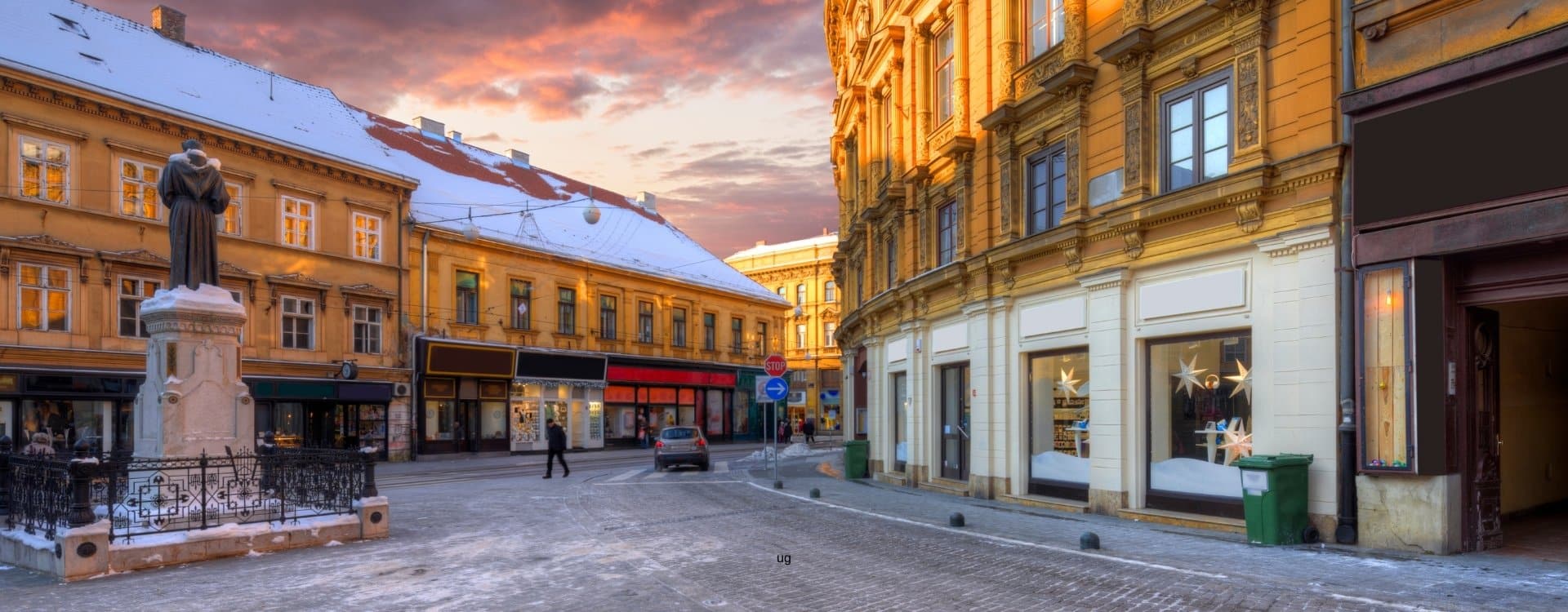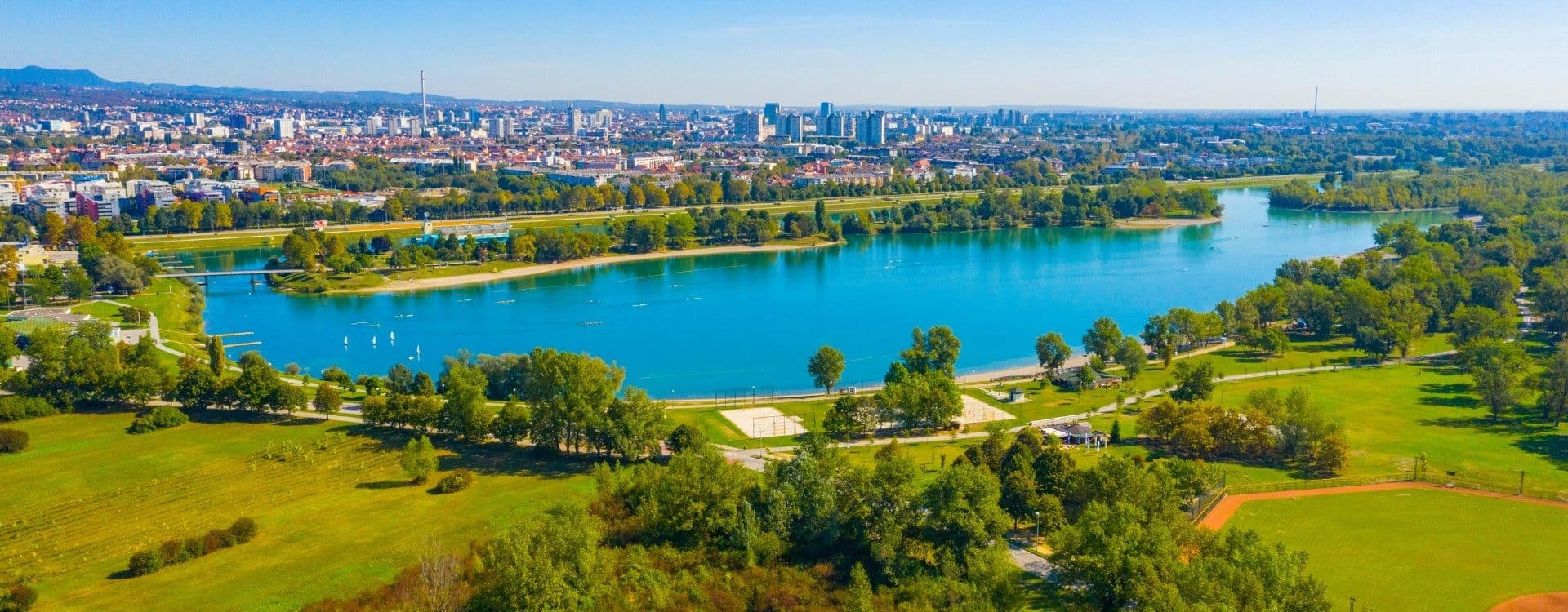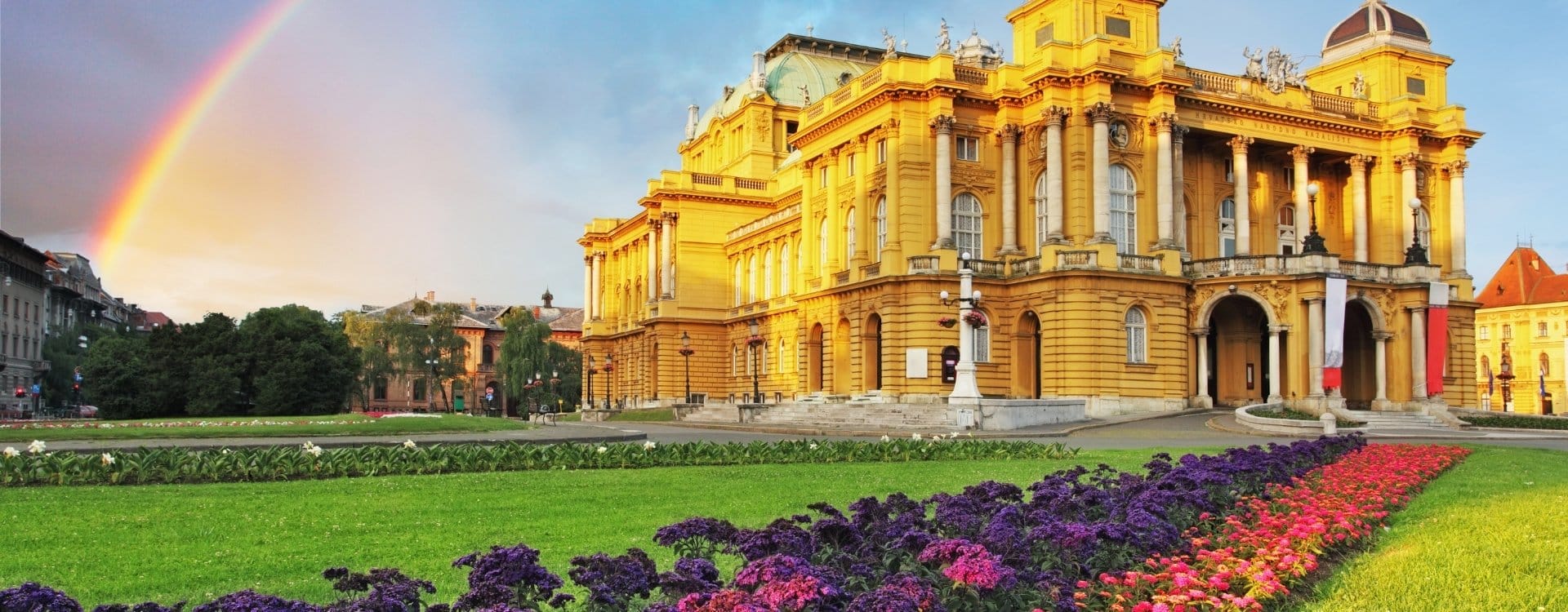Live and work in Zagreb
Latest jobs in Zagreb and Croatia
- Adventure jobs, Hotel jobs, Tourism
- Bulgaria, Croatia, Egypt, Greece, Italy, Spain, Turkey
- Adventure jobs, Hotel jobs, Tourism
- Bulgaria, Croatia, Egypt, Greece, Italy, Spain, Turkey
- Adventure jobs, Hotel jobs, Tourism
- Bulgaria, Croatia, Egypt, Greece, Italy, Spain, Turkey
- Adventure jobs, Hotel jobs, Tourism
- Bulgaria, Croatia, Egypt, Greece, Italy, Spain, Turkey
- Adventure jobs, Hotel jobs, Tourism
- Bulgaria, Croatia, Egypt, Greece, Italy, Spain, Turkey
If you fancy living in a southern country and in a modern and highly cultural capital city, try living in Zagreb the next time you decide to move.
Trying to work abroad for a while can be an extremely fulfilling and educational experience that most people don’t want to miss once they’ve tried it.
Zagreb is the capital of Croatia, home to just over 684 thousand people. Zagreb, as well as the rest of Croatia as a country, enjoys a pleasant climate almost all year round.
Working in Zagreb
Working Conditions in Zagreb
Zagreb is Croatia’s economic and cultural hub, offering a professional environment influenced by European Union standards. A typical workweek in Zagreb spans 40 hours, Monday through Friday, with working hours generally from 8 am to 4 pm or 9 am to 5 pm. In many industries, the pace of work is structured yet relaxed, reflecting Croatia’s balance between productivity and leisure.
Employees are entitled to 20 days of paid leave annually, along with 14 public holidays. These benefits align Zagreb with other European capitals in terms of labor protections. Overtime is less common than in more fast-paced cities like London or Berlin, as work-life balance is a priority for many Croatian companies.
Business etiquette in Zagreb is professional but approachable. Hierarchies are respected, though collaboration and teamwork are highly valued. Fluency in English is a significant advantage, especially for roles in international companies, but knowledge of Croatian can help expats integrate more easily into the workplace and local community.
Job Opportunities in Zagreb
Zagreb offers diverse job opportunities across finance, IT, education, healthcare, and tourism. As Croatia’s main business center, the city is home to numerous multinational corporations, start-ups, and government institutions.
Finance and Banking: Zagreb is the financial hub of Croatia, with many banks, insurance companies, and financial services firms headquartered in the city. Professionals with experience in accounting, banking, or investment management will find ample opportunities.
IT and Start-ups: The IT sector in Zagreb is rapidly growing, with many start-ups and established companies offering roles in software development, cybersecurity, and data analysis. Compared to tech hubs like Berlin or Amsterdam, Zagreb offers a smaller but close-knit community of tech professionals, with a lower cost of living.
Education: Teaching English is a common job for expats in Zagreb. International schools and language academies often hire native speakers, while universities like the University of Zagreb offer roles for academic professionals.
Tourism: While tourism is more prominent in Croatia’s coastal areas, Zagreb’s increasing popularity as a year-round destination has created jobs in hospitality, event planning, and cultural tourism.
Networking is crucial in Zagreb, and many expats find jobs through professional events or personal connections. Platforms like LinkedIn, MojPosao, and Indeed Croatia are excellent resources for job hunting.
Salaries in Zagreb
Salaries in Zagreb are higher than the national average but still lower compared to Western European capitals. The average monthly salary in Zagreb is approximately €1,100 (gross), though skilled professionals in fields like IT or finance can earn between €1,800 and €3,500.
Freelancers and remote workers earning international salaries often enjoy a better quality of life due to Zagreb’s relatively low cost of living. Many companies also provide additional benefits such as meal allowances, transportation subsidies, and performance-based bonuses.
While salaries may not compare to cities like Vienna or Munich, the lower cost of housing, food, and transportation in Zagreb helps offset the difference, making it an attractive option for professionals seeking affordability without sacrificing urban amenities.
Income Tax in Zagreb
Croatia’s income tax system is progressive, with rates ranging from 20% to 30%, depending on income. Social security contributions, which cover healthcare, pensions, and unemployment benefits, are also deducted from salaries. Expats working for Croatian companies will have these contributions automatically handled by their employers.
Freelancers and remote workers must manage their own tax filings, which can be complex but manageable with the help of local accountants or tax advisors. Croatia has double taxation agreements with many countries, reducing the burden for expats with foreign income.
Working Culture in Zagreb
The working culture in Zagreb emphasizes professionalism, collaboration, and work-life balance. Unlike the fast-paced environments of cities like London or New York, Zagreb’s work culture allows time for personal connections and socializing. Lunch breaks are valued, with many professionals enjoying a meal at nearby restaurants or cafés.
Networking and building relationships are essential, as personal connections often play a significant role in career advancement. While punctuality is appreciated, Croatian workplaces are generally forgiving about small delays, reflecting the country’s relaxed Mediterranean influence.
Networking in Zagreb
Zagreb offers numerous opportunities for networking, particularly in its thriving start-up and business communities. Co-working spaces like HUB385 and Impact Hub Zagreb host events, workshops, and meetups for entrepreneurs, tech professionals, and freelancers. Expats can also join organizations like AmCham Croatia or attend events organized by the British-Croatian Chamber of Commerce.
Tech enthusiasts can explore Zagreb’s growing IT scene through hackathons, conferences, and meetups. Social media groups and platforms like Expats in Zagreb are also great for meeting locals and fellow expats.

Benefits of living and working in Zagreb
Croatia is a fairly central country that is surrounded by a lot of other southern countries. These countries are Hungary and Slovenia to the north, Bosnia to the east and to the south the Adriatic Sea stretches, which means the country has a very long coastline.
If you find a job in Zagreb, this opens up a lot of opportunities to travel widely to the surrounding European countries. When you live at home in Denmark, there is not the same opportunity to travel to neighboring countries, and you can say that if you work in Zagreb, you can almost every weekend take a short drive to, for example, Slovenia, which is right on the border and very close to Zagreb city.

Living in Zagreb
Benefits of Living and Working in Zagreb
Zagreb offers a unique combination of affordability, cultural richness, and modern amenities. The city’s excellent healthcare system, accessible public transport, and vibrant social scene make it an attractive place for expats. While smaller than capitals like Berlin or Paris, Zagreb is a cosmopolitan city with a relaxed atmosphere and a strong sense of community.
The cost of living in Zagreb is lower than in many Western European cities, allowing expats to enjoy a high quality of life. From its charming historic center to its lively markets and cultural festivals, Zagreb provides a balanced lifestyle that appeals to families, young professionals, and retirees alike.
Accommodation in Zagreb
Finding accommodation in Zagreb is relatively straightforward. A one-bedroom apartment in the city center costs between €500 and €700 per month, while apartments in suburban areas like Maksimir or Trešnjevka are more affordable, averaging €400 to €600.
Long-term rentals are common, and expats are encouraged to use platforms like Njuškalo.hr or real estate agencies to find housing. Landlords often request a one-year lease and a deposit equivalent to one or two months’ rent. Utilities are usually not included in the rent, costing an additional €100 to €150 per month.
Cost of Living in Zagreb
Zagreb’s cost of living is affordable compared to other European capitals. A single person can expect to spend around €1,000 to €1,500 per month, depending on lifestyle.
- Groceries: Weekly grocery bills average €40 to €60, with local markets offering fresh produce at lower prices than supermarkets.
- Dining Out: Eating out is popular and affordable, with a meal at a mid-range restaurant costing around €10 to €15. Traditional Croatian dishes, such as ćevapi and štrukli, are must-tries.
- Transport: Public transportation is efficient and affordable, with monthly passes costing €30.
Where to Live in Zagreb
Zagreb’s neighborhoods offer something for everyone:
- Donji Grad (Lower Town): The city center is ideal for professionals and young expats, offering proximity to cultural sites, restaurants, and shops.
- Maksimir: A quieter, family-friendly neighborhood with access to Maksimir Park, one of the largest green spaces in the city.
- Trešnjevka: A more affordable area with a local vibe, offering excellent transport links and community markets.
- Jarun: Perfect for outdoor enthusiasts, with its proximity to Lake Jarun, a popular spot for recreation and nightlife.
Public Transport in Zagreb
Zagreb’s public transport system includes buses, trams, and suburban trains, all managed by ZET. The tram network is extensive and reliable, covering most of the city. A monthly pass costs around €30, making it an affordable option for daily commuting.
Cycling is also becoming increasingly popular, with bike-sharing services available throughout the city. For those who prefer driving, traffic can be challenging during peak hours, but parking is widely available.
Eating in Zagreb: Restaurants and Food Costs
Zagreb’s food scene is a delightful mix of traditional Croatian cuisine and international options. Local restaurants, known as konobas, serve hearty dishes at affordable prices, while fine dining options cater to those seeking a more upscale experience.
Street markets, such as Dolac Market, are perfect for buying fresh produce, cheeses, and local specialties. For a coffee break, Zagreb’s café culture is unparalleled, with countless spots to enjoy an espresso for just €1.50 to €2.
Zagreb’s Nightlife
Zagreb’s nightlife caters to all tastes, from cozy wine bars and live music venues to lively nightclubs. Popular areas like Tkalčićeva Street and Jarun Lake are bustling with activity, offering a mix of traditional pubs and trendy bars.
Events like the Advent in Zagreb festival and the INmusic Festival bring the city to life, making it an exciting place to socialize and explore cultural events.
Weather in Zagreb
Zagreb has a continental climate, with hot summers and cold winters. Summer temperatures average 25-30°C (77-86°F), while winters can drop to 0°C (32°F) or lower. Spring and autumn are mild and ideal for outdoor activities. The city occasionally experiences snowfall, adding a magical touch to its winter months.
Zagreb’s Nature and Outdoor Activities
Despite being an urban center, Zagreb is surrounded by nature. Maksimir Park and Medvednica Mountain offer excellent opportunities for hiking, cycling, and picnics. Lake Jarun is a favorite spot for water sports and outdoor events.
For weekend getaways, Zagreb’s central location provides easy access to Plitvice Lakes, Sljeme, and Croatia’s stunning Adriatic coast.
What Not to Miss in Zagreb
Zagreb is rich in history and culture, with attractions like Ban Jelačić Square, Zagreb Cathedral, and the Museum of Broken Relationships drawing visitors year-round. The city’s green spaces, vibrant markets, and cultural festivals ensure there’s always something to explore.

Healthcare in Zagreb
Despite the fact that there are so many advantages to living in Zagreb, when it comes to healthcare in the city and the rest of Croatia, it’s not quite so straightforward. You could say it’s something of a luxury for us Danes to live in a country where we take public healthcare for granted because it’s free. However, we must remember that in Denmark we pay a much higher tax on our salary, which then goes to finance the healthcare system, whereas in Zagreb and Croatia in general there is not as high a tax, so it makes sense that healthcare is not free in Zagreb.
However, there are some things that are included in the public sector when you are treated or go to a consultation, for example, but there will typically always be a percentage that has to be paid out of pocket.
Many locals in Zagreb do this by signing up for private health insurance, which they then pay a small monthly fee to, so they can cover the extra costs that way.
Visa and travel insurance in Zagreb
Croatia as a country hasn’t actually been a part of the EU for that many years again, it was only back in 2013 that Croatia was officially declared an EU country. This also just means that it’s not necessary to apply for a visa if you’re a citizen of an EU country.
Since you’re not covered by public health care in Zagreb in the same way as you are when you live in your home country, it might be a good idea to invest in some form of travel insurance in case you fall ill at the beginning of your stay. Travel insurance is also handy to have if you become very ill and need to be repatriated to Denmark, for example.
Safety in Zagreb
As mentioned earlier, Zagreb is a fairly large city, but it’s not a big city as such, so most locals in the city know each other, at least if they live in the same neighborhood.
The Croatian culture is just very warm and people are super friendly in Zagreb and the rest of the country, which also means you can feel safe and comfortable walking around the streets.
The crime rate is very low and although there are thieves, as there are in every city in the world, it’s not something that is widespread in the city.







